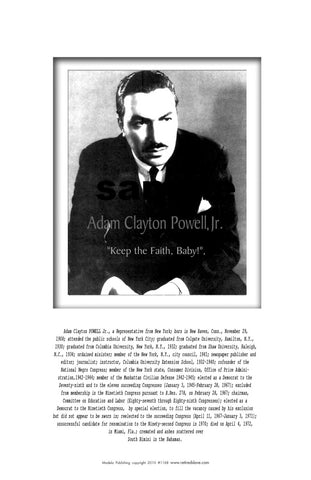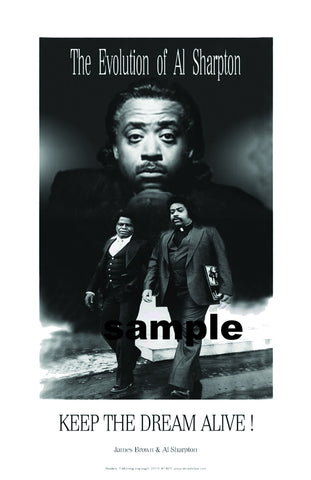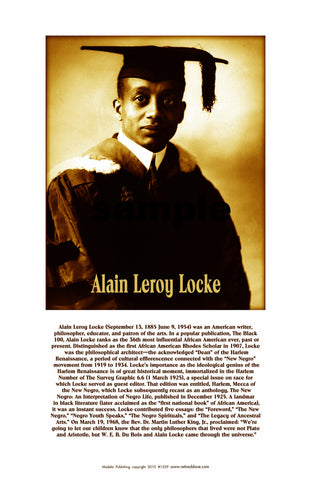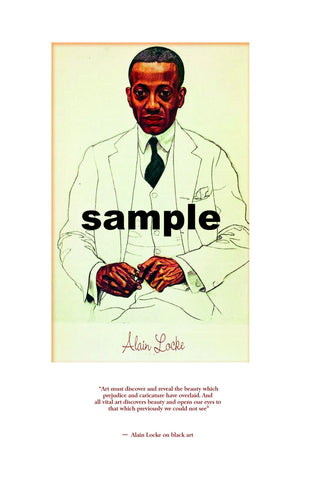Langston Hughes #1123
$ 8.00
Caption from poster__
Let America be America again.
Let it be the dream it used to be.
Let it be the pioneer on the plain
Seeking a home where he himself is free.
(America never was America to me.)
Let America be the dream the dreamers dreamed--
Let it be that great strong land of love
Where never kings connive nor tyrants scheme
That any man be crushed by one above.
(It never was America to me.)
O, let my land be a land where Liberty
Is crowned with no false patriotic wreath,
But opportunity is real, and life is free,
Equality is in the air we breathe.
(There's never been equality for me,
Nor freedom in this "homeland of the free.")
Say, who are you that mumbles in the dark?
And who are you that draws your veil across the stars?
I am the poor white, fooled and pushed apart,
I am the Negro bearing slavery's scars.
I am the red man driven from the land,
I am the immigrant clutching the hope I seek--
And finding only the same old stupid plan
Of dog eat dog, of mighty crush the weak.
I am the young man, full of strength and hope,
Tangled in that ancient endless chain
Of profit, power, gain, of grab the land!
Of grab the gold! Of grab the ways of satisfying need!
Of work the men! Of take the pay!
Of owning everything for one's own greed!
I am the farmer, bondsman to the soil.
I am the worker sold to the machine.
I am the Negro, servant to you all.
I am the people, humble, hungry, mean--
Hungry yet today despite the dream.
Beaten yet today--O, Pioneers!
I am the man who never got ahead,
The poorest worker bartered through the years.
Yet I'm the one who dreamt our basic dream
In the Old World while still a serf of kings,
Who dreamt a dream so strong, so brave, so true,
That even yet its mighty daring sings
In every brick and stone, in every furrow turned
That's made America the land it has become.
O, I'm the man who sailed those early seas
In search of what I meant to be my home--
For I'm the one who left dark Ireland's shore,
And Poland's plain, and England's grassy lea,
And torn from Black Africa's strand I came
To build a "homeland of the free."
The free?
Langston Hughes -- born February 1, 1902, in Joplin, Missouri -- is usually considered the dean of American Negro poets. His parents divorced when he was a child, and his father moved to Mexico. he was raised by his grandmother until he was thirteen, when he moved to Lincoln, Illinois, to live with his mother and her husband, eventually settling in Cleveland, Ohio. It was in Lincoln that Hughes began writing poetry.
Following graduation from high school, Hughes spent a year in Mexico and a year at Columbia university. During these years, he held odd jobs as an assistant cook, launderer, and a busboy, and traveled to Africa and Europe working as a seaman. in November 1924, he moved to Washington, D.C. Hughes first book of Poetry, The Weary Blues, was published by Alfred A Knopf in 1926. he finished his college education at Lincoln University in Pennsylvania three years later. in 1930 his first novel, Not Without laughter, won the Harmon gold medal for literature.
Paul Lawrence Dunbar, Carl Sandburg, and Walt Whitman were Hughes primary literary influences. He is known for his insightful, colorful portrayals of black life in America from the twenties through the sixties. He wrote novels, short stories and plays, as well as poetry, and is also known for his engagement with the world of jazz and the influence it had on his writing, as in montage of a dream deferred.
His life and work were influential in the shaping of what came to be known as the Harlem Renaissance of the 1920s. Unlike Claude McKay, Jean Toomer, and Countee Cullen, Hughes identified fiercely his personal experience with that of the common experiences of the American Negro. He wanted to tell their stories that reflected their dignity, humor, suffering, and language.
Langston died of complications from prostate cancer May 22, 1967, in New York. In his memory, his residence at 20 East 127th Street in Harlem, New York City, has been given landmark status by the New York City Preservation Commission, and east 127th Street was renamed "Langston Hughes Place."
Print with Black Frames $25.00
For 24" x 36' Size prints
please call 678-608-7892 to order




